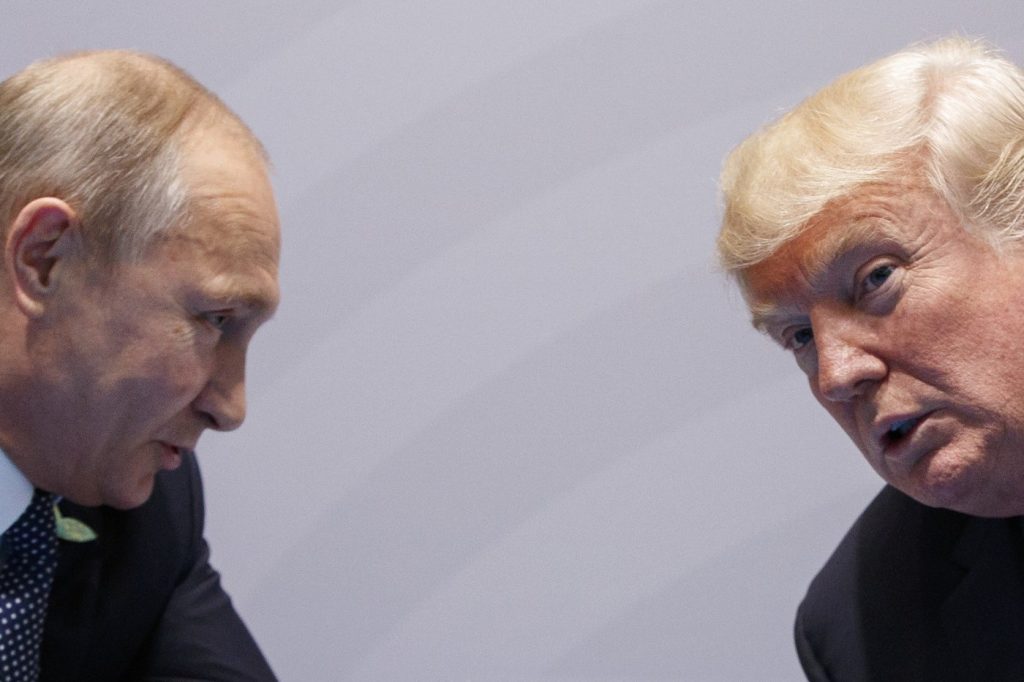ANCHORAGE, Alaska (AP) — U.S. President Donald Trump is scheduled to meet face-to-face with Russian President Vladimir Putin on Friday for a high-stakes summit that may significantly impact the trajectory of the ongoing war in Ukraine and European security as a whole. The meeting is set to unfold at Joint Base Elmendorf-Richardson, a military base located near Anchorage, Alaska.
This summit provides Trump with a unique opportunity to showcase his skills as a dealmaker and peacemaker on the global stage. His allies have positioned him as a heavyweight negotiator capable of bringing a swift end to what they describe as "the slaughter," a claim he has previously made with confidence.
On the other hand, for Putin, the meeting serves as a critical platform to negotiate a potential agreement that could solidify Russia's territorial gains, thwart Ukraine's ambitions to join the NATO military alliance, and ultimately pull Ukraine back under Moscow's influence. However, the summit carries considerable risks for Trump as well. By hosting Putin in the United States, he runs the risk of providing Russia's leader with the recognition he seeks, especially following the international ostracization due to his invasion of Ukraine over three years ago. Furthermore, the absence of Ukrainian President Volodymyr Zelenskyy from the discussions undermines the principle of "nothing about Ukraine without Ukraine," raising concerns that Trump might agree to terms detrimental to Ukraine's interests.
Despite the potential for success, achieving a peaceful resolution appears far from guaranteed. The ongoing negotiations reflect deep divisions in the demands of both Russia and Ukraine. For instance, Putin has consistently opposed any temporary ceasefire unless it is coupled with a halt to Western military assistance to Ukraine, a condition that Kyiv, along with its Western allies, has categorically rejected.
Trump has expressed uncertainty regarding the likelihood of an immediate ceasefire but emphasized his desire for a broad peace deal to be completed promptly. Remarkably, his statement appears to echo Putin's calls for a comprehensive agreement that aligns with Russian demands, rather than simply a temporary cessation of hostilities.
According to the Kremlin, the meeting will commence with a private conversation between Trump and Putin, followed by discussions between the two delegations that will include a "working breakfast." A joint press conference is also anticipated. In the lead-up to the summit, Trump has issued differing accounts of his objectives; he referred to the meeting as a "feel-out" opportunity but later warned of "very severe consequences" for Russia should Putin fail to agree to end the conflict, asserting that Putin would not intimidate him as he has with other leaders.
Trump's suggestion that any agreement could involve "some swapping of territories" has caused disappointment among Ukrainian and European officials, raising skepticism about the potential outcome of the summit. Ian Kelly, a retired Foreign Service officer who served as U.S. ambassador to Georgia, indicated that the summit presents little advantage for the U.S. and could serve only to benefit Putin.
Amid rising skepticism, George Beebe, former director of the CIA's Russia analysis team, expressed concerns about the risks of misunderstandings during such a significant, hastily arranged summit. Nonetheless, he speculated that Trump likely felt assured about the prospects for tangible outcomes, due to preparatory discussions behind the scenes.
As the summit approaches, Zelenskyy has reiterated his doubts about Putin's sincerity in negotiations. European allies, who have held urgent meetings with U.S. leaders, have emphasized the necessity for Ukraine's participation in any peace discussions. Observers in Moscow have reveled in the fact that the summit sidelines Ukraine and its European supporters.
The summit carries the potential for far-reaching implications, as foreign governments closely monitor Trump's demeanor during negotiations with Putin. The conflict has inflicted severe casualties and depleted resources on both sides, and Ukraine, having held out longer than many anticipated since the February 2022 invasion, continues to grapple with a powerful Russian military, enduring relentless bombardments and fierce battles across the extensive front line.
Lastly, Andrea Kendall-Taylor, a senior fellow at the Center for a New American Security, noted that adversarial states such as China, Iran, and North Korea will closely observe Trump's interactions with Putin to assess whether his threats are credible or if, as in the past, he might back down from pressure commitments. Despite some criticisms of the summit's location, Trump has defended the choice of Alaska, viewing it as a respectful gesture toward Putin amidst this significant diplomatic encounter.











